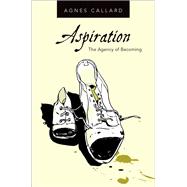
Aspiration The Agency of Becoming
by Callard, Agnes-

This Item Qualifies for Free Shipping!*
*Excludes marketplace orders.
Buy New
Rent Textbook
Rent Digital
Used Textbook
We're Sorry
Sold Out
How Marketplace Works:
- This item is offered by an independent seller and not shipped from our warehouse
- Item details like edition and cover design may differ from our description; see seller's comments before ordering.
- Sellers much confirm and ship within two business days; otherwise, the order will be cancelled and refunded.
- Marketplace purchases cannot be returned to eCampus.com. Contact the seller directly for inquiries; if no response within two days, contact customer service.
- Additional shipping costs apply to Marketplace purchases. Review shipping costs at checkout.
Summary
Author Biography
Agnes Callard was born in Budapest, Hungary, raised in New York City and received a BA from the University of Chicago. She left Chicago for the University of California, Berkeley, where she received an MA in Classics and a PhD in Philosophy, and subsequently returned to the University of Chicago to teach in the philosophy department. Her areas of specialization are ancient philosophy and ethics.
Table of Contents
Introduction
Section I: Practical Rationality
Chapter 1: Decision Theory and Transformative Choice
Chapter 2: Proleptic Reasons
Section II: Moral Psychology
Chapter 3: Intrinsic and Extrinsic Conflict
Chapter 4: Akrasia
Section III: Moral Responsibility
Chapter 5: The Problem of Self-Creation
Chapter 6: Self-Creation and Responsibility
Conclusion
Bibliography
An electronic version of this book is available through VitalSource.
This book is viewable on PC, Mac, iPhone, iPad, iPod Touch, and most smartphones.
By purchasing, you will be able to view this book online, as well as download it, for the chosen number of days.
Digital License
You are licensing a digital product for a set duration. Durations are set forth in the product description, with "Lifetime" typically meaning five (5) years of online access and permanent download to a supported device. All licenses are non-transferable.
More details can be found here.
A downloadable version of this book is available through the eCampus Reader or compatible Adobe readers.
Applications are available on iOS, Android, PC, Mac, and Windows Mobile platforms.
Please view the compatibility matrix prior to purchase.
